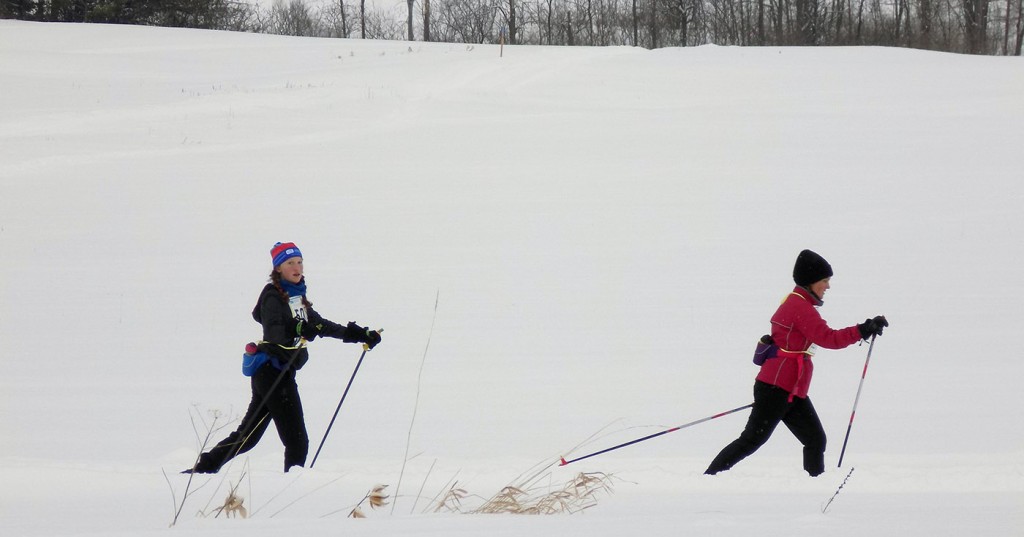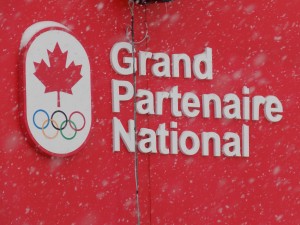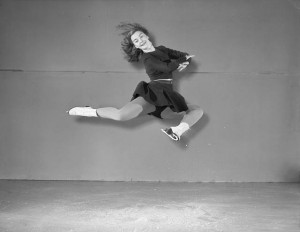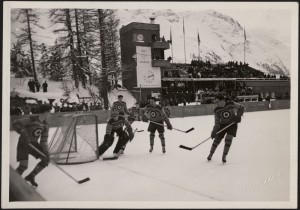Amateur winter sports and the Canadian Olympic spirit
Amateurs
We’re at peak winter sports mania right now in Canada. The Olympic Winter Games are on in Pyeongchang, South Korea and it seems like every community large or small has a winter sport event of some kind going on right now. The common thing with the Olympics and the various races, tournaments, bonspiels etc. is that they all involve amateur athletes. Whether it’s a family doing a cross-country ski marathon or Olympic ski jumping, they are all amateur athletes. Of course, Olympians train heavily for years, but none of these people are making millions of dollars to play in pro leagues.

A mother and daughter from Ottawa near the finish line at the Canadian Ski Marathon in Montebello, Quebec. Photo: James Morgan
A long trek on skis
In Quebec, the Canadian Ski Marathon (CSM) tour ran from February 9 to 11. Over 1,500 cross-country skiers of all ages, most of whom were from Ontario, Quebec, New York, and New England participated. The whole event covers 160 kilometers, or 99.4 miles, from Mont Tremblant to Lachute. The Saturday portion of the marathon totaled 79.6km/49.4 miles and was divided into four shorter sections of 9.2km/5.7 miles, 22km/13.6 miles, 20.8km/13 miles, 11.5km/7 miles, and 16km/10 miles. Skiers can complete the entire tour or choose whichever sections they want to complete.
Unlike many ski tour events, the CSM does not emphasize winning or losing, although it does keep track of the time each participant takes to complete their section. Just after noon on Saturday, skiers started completing their descent out of the Laurentian Mountains and were crossing the finish line in the schoolyard in the village of Montebello on the Ottawa River. Children as young as 10 smiled as they skated down Bonsecours Street toward the finish line. There were father-son, mother-daughter pairs, entire families, and retired people skiing on their own. It wasn’t the Olympics, but the CSM had the spirit of comradery, friendship, and amateur achievement that the games are supposed to have.
Olympics and Canadian culture

Olympic sponsorship is part of the permanent signage on the Canadian Tire store in Buckingham, Quebec. Photo: James Morgan
Canada has traditionally done better at Winter Olympics than it has at summer games. Geography and winter weather probably have a lot to do with that. Sure, Montreal hosted the 1976 summer Olympics, but it wasn’t Canada’s greatest athletic achievement, and it was a financial disaster that left taxpayers on the hook for decades after. We hosted the 1988 Winter Olympics in Calgary and the 2010 games in Vancouver. Those were much better, athletically and financially.
Winter Olympic achievement in Canada has become part of the national kitsch. Canadian Tire, that noted hardware and sporting goods chain, is one of many Canadian companies that loves to advertise the fact it’s a major sponsor of the Canadian Olympic Foundation. The Hudson’s Bay Company, that iconic fur trader turned department store, is another big sponsor. They’ve been the official Team Canada uniform designer for several years now and sell a complete line of Olympic clothing in their stores and online. Gas station chain Petro Canada has been a big sponsor for over 30 years, too. Any Canadian who remembers the 1988 games will recall the emotion-wrenching, patriotism-laced Petro-Canada commercials urging everyone to “Share the flame” as the Olympic torch relay made its way across the country to Calgary. And, it seemed like one in two Canadian households must have had part or all the set of Olympic torch glasses that were being offered for a small additional fee with a fill-up at “Petro-Can.”

Barbara-Ann Scott won a gold medal for women’s figure skating at the 1948 Winter Olympics in St. Moritz, Switzerland. “Study of a skating leap,” photo by Frank Royal, 1948. Library and Archives Canada, R10436-0-6-E
Figure skater Barbara-Ann Scott, who won the Gold medal in the 1948 games in St. Moritz Switzerland, had her likeness made into a doll sold by the Reliable Toy Company of Toronto and was sold by the now-defunct Eaton’s department store chain. 1980s/1990s Olympic figure skaters like Elizabeth Manley and Elvis Stojko appeared in TV commercials for McCain frozen French Fries, pizza, and fruit punch mix. Skier Nancy Greene, who won a gold medal at the 1968 winter games in Grenoble, France, is now a member of the Canadian Senate. These are the Canadian equivalents of getting on the Wheaties box.
No pros in Olympic hockey

The RCAF Flyers representing Canada on the ice playing Sweden on January 30, 1948 at the Winter Olympics in St. Moritz. The team is wearing their regular uniform showing the Royal Canadian Air Force roundel. Library and Archives Canada, R15559-22-2-E
The Pyeongchang games will be the most amateur in several years. The NHL isn’t allowing its players to play, so men’s Olympic teams are made up of mostly players from the junior ranks. Hopefully this won’t diminish the attention Olympic hockey gets from Canadians. Hopefully, it will also lessen the tendency of fans and the media to ignore the Canadian women’s team, which also has a record of winning several gold and silver medals, but just never seemed to get as much attention.
Decades ago, Olympic hockey teams were all composed of non-professionals. The 1948 men’s gold medalists in St. Moritz were the RCAF Flyers, which was mostly composed of air force and some army personnel from Ottawa. They, like many of today’s Olympians, and certainly those marathon skiers, were in it for the experience and comradery.







